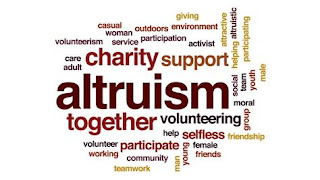Rhoads, S. A., Vekaria, K. M. et al. (2023).
Nature Communications
Published online 31 March 23
Abstract
Acts of extraordinary, costly altruism, in which significant risks or costs are assumed to benefit strangers, have long represented a motivational puzzle. But the features that consistently distinguish individuals who engage in such acts have not been identified. We assess six groups of real-world extraordinary altruists who had performed costly or risky and normatively rare (<0.00005% per capita) altruistic acts: heroic rescues, non-directed and directed kidney donations, liver donations, marrow or hematopoietic stem cell donations, and humanitarian aid work. Here, we show that the features that best distinguish altruists from controls are traits and decision-making patterns indicating unusually high valuation of others’ outcomes: high Honesty-Humility, reduced Social Discounting, and reduced Personal Distress. Two independent samples of adults who were asked what traits would characterize altruists failed to predict this pattern. These findings suggest that theories regarding self- focused motivations for altruism (e.g., self-enhancing reciprocity, reputation enhancement) alone are insufficient explanations for acts of real-world self- sacrifice.
From the Discussion Section
That extraordinary altruists are consistently distinguished by a common set of traits linked to unselfishness is particularly noteworthy given the differences in the demographics of the various altruistic groups we sampled and the differences in the forms of altruism they have engaged in—from acts of physical heroism to the decision to donate bone marrow. This finding replicates and extends findings from a previous study demonstrating that extraordinary altruists show heighted subjective valuation of socially distant others. In addition, our results are consistent with a recent meta-analysis of 770 studies finding a strong and consistent relationship between Honesty-Humility and various forms of self-reported and laboratory-measured prosociality. Coupled with findings that low levels of unselfish traits (e.g., low Honesty-Humility, high social discounting) correspond to exploitative and antisocial behaviors such as cheating and aggression, these results also lend support to the notion of a bipolar caring continuum along which individuals vary in the degree to which they subjectively value (care about) the welfare of others. They further suggest altruism—arguably the willingness to be voluntarily “exploited” by others—to be the opposite of phenotypes like psychopathy that are characterized by exploiting others. These traits may best predict behavior in novel contexts lacking strong norms, particularly when decisions are made rapidly and intuitively. Notably, people who are higher in prosociality are more likely to participate in psychological research to begin with—thus the observed differences between altruists and controls may be underestimates (i.e., population-level differences may be larger).


